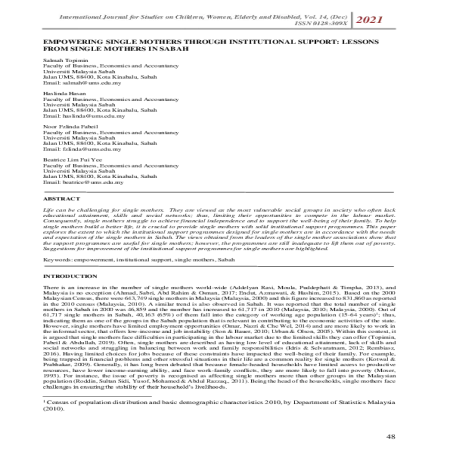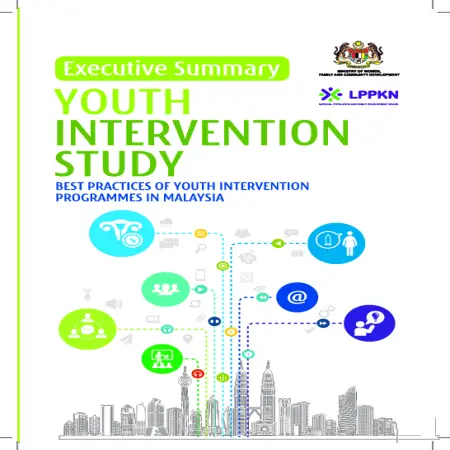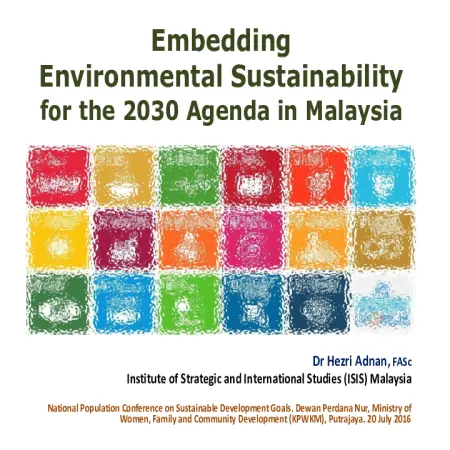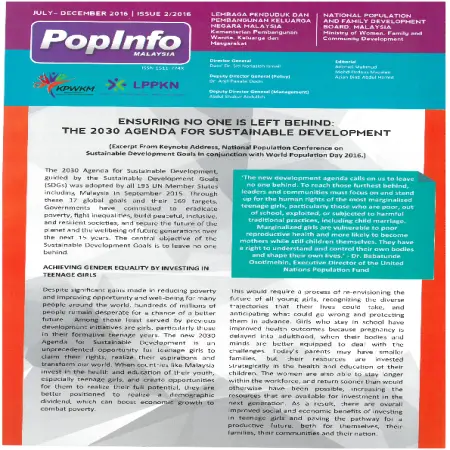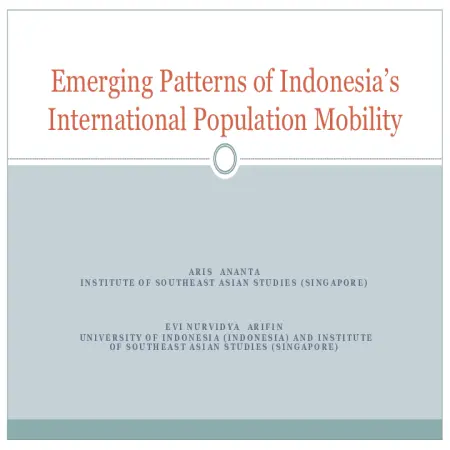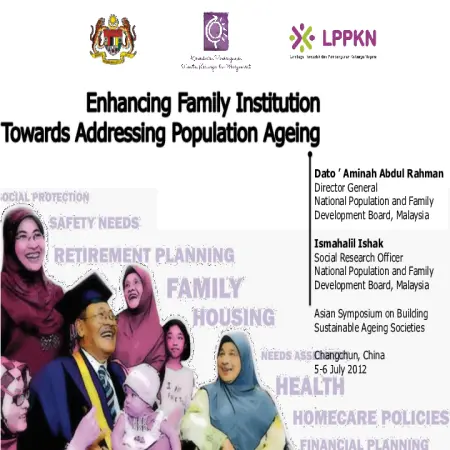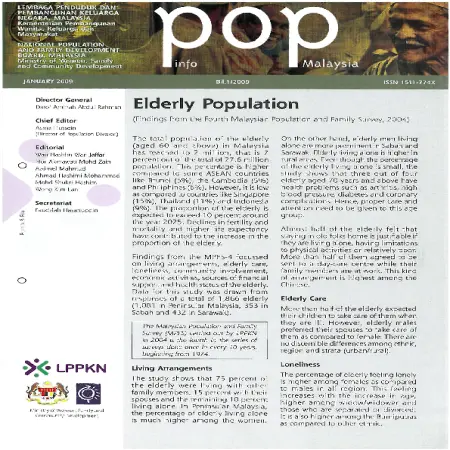Browse by Subject
Results for Search : "305 Social groups"
|
|
Empowering single mothers through institutional support: lessons from single mothers in Sabah
Item Type: Article
Editor:
Year: 00/12/2021
Abstract: Life can be challenging for single mothers. They are viewed as the most vulnerable social groups in society who often lack educational attainment, skills and social networks; thus, limiting their opportunities to compete in the labour market. Consequently, single mothers struggle to achieve financial independence and to support the well-being of their family. To help single mothers build a better life, it is crucial to provide single mothers with solid institutional support programmes. This paper explores the extent to which the institutional support programmes designed for single mothers are in accordance with the needs and expectation of the single mothers in Sabah. The views obtained from the leaders of the single mother associations show that the support programmes are useful for single mothers; however, the programmes are still inadequate to lift them out of poverty. Suggestions for improvement of the institutional support programmes for single mothers are highlighted.
|
|
|
|
|
|
Executive Summary: youth intervention study: best practices of youth intervention programmes in Malaysia
Item Type: Research Report
Editor:
Year: 01/07/2020
Abstract: In the decades, Malaysia has undergone rapid economic, social and cultural changes which impacted not only the daily lives of its people but also their worldview and values. This is particularly so for young people, as excessive exposure to information from the social media, internet and pornography had inevitably influence their lifestyle and behaviour. The socio-cultural changes are likely associated with an increased rates of non-marital sexual activity, increased rates of sex partner change and increased rates of sexually transmitted infections (STIs). In 2005, the Ministry of Women, Family and Community Development through NPFDB introduced the PEKERTI Programme to be implemented at KafeTEEN adolescents centres. The programme provides reproductive health services, counseling services and education and skill building to promote a healthy life and inculcate positive attitudes and moral values among young people.
|
|
|
|
|
|
Embedding the environment sustainability for the 2030 agenda in Malaysia
Item Type: Conference or Workshop Item
Editor:
Year: 00/00/2016
Abstract: The presentation will outline the rationale and overarching vision for embedding the environment in the SDGs. These are guided by four interlocking ideas: the environment is a prerequisite for socio-economic development; human health and wellbeing depends on good environmental quality; environment has intrinsic values; and finally, protecting the environment can be a new source of economic growth.
|
|
|
|
|
|
Ensuring no one is left behind: the 2030 agenda for sustainable development
Item Type: Newsletter
Editor:
Year: 00/00/2016
Abstract: The 2030 Agenda for Sustainable Development, guided by the Sustainable Development Goals (SDGs) was adopted by all 193 UN Member States including Malaysia in September 2015. Through these 17 global goals and their 169 targets, Government have committed to eradicate poverty, fight inequalities, build peaceful, inclusive, and resilient societies, and secure the future of the planet and the well being of future generations over the next 15 years. The central objective of the Sustainable Development Goals is to leave no one behind.
|
|
|
|
|
|
Ethnicity and support for parents in Malaysia
Item Type: Article
Editor:
Year: 00/12/2013
Abstract: This study analyzed support as reported by adult women to parents and parents-in-law in a multi-ethnic setting. It examined ethnic diversity and other influencing factors in the provision of support. Data utilized came from the Women sample of the 2004 Malaysian Population and Family Survey and was filtered to include the three largest ethnic groups in Malaysia- Malays, Chinesse and Indians.
|
|
|
|
|
|
Emerging patterns of Indonesia's international population mobility
Item Type: Conference or Workshop Item
Editor:
Year: 00/00/2013
Abstract: This paper attempts to examine some new trends in Indonesia’s international migration, both out-migration from and in-migration to Indonesia. More and more Indonesians have moved to other countries to pursue higher education, job opportunities and to settle down. On the other hand, rapid economic growth and the large consumer market have attracted increasing number of foreigners to work and invest in Indonesia. International population mobility is becoming a more important demographic process, with profound ramifications on economic development in Indonesia and other countries, in ASEAN and beyond.
|
|
|
|
|
|
Enhancing family institution towards addressing population ageing
Item Type: Conference or Workshop Item
Editor:
Year: 00/00/2012
Abstract: Malaysia will be aged by the year 2030. The objective of National Policy for Older Persons, 2011 is to enhance the respect for and self-worth of the elderly in family, society and nation at the same time to develop the potential of the elderly so that they remain active and productive in national development and to create opportunities for them to continue to live independently and to encourage the establishment and the provision of specific facilities to ensure the care and protection of the elderly. The areas of Plan of Action: Promotion and Advocacy, Lifelong Learning, Safety and Protection, Governance and Shared Reasonability, Involvement and Intergenerational Solidarity, Research and Development.
|
|
|
|
|
|
Elderly population
Item Type: Newsletter
Editor:
Year: 00/01/2009
Abstract: The total population of the elderly (aged 60 and above) in Malaysia has reached to 2 million, that is 7 per cent out of the total of 27.6 million population. The proportion of the elderly is expected to exceed 10 per cent around the year 2025. Finding from the MPFS-4 focussed on living arrangements, elderly care, loneliness, community involvement, economic activities, sources of financial support and health status of the elderly. Data for this study was drawn from responses of a total of 1,866 elderly.
|
|
|
|





